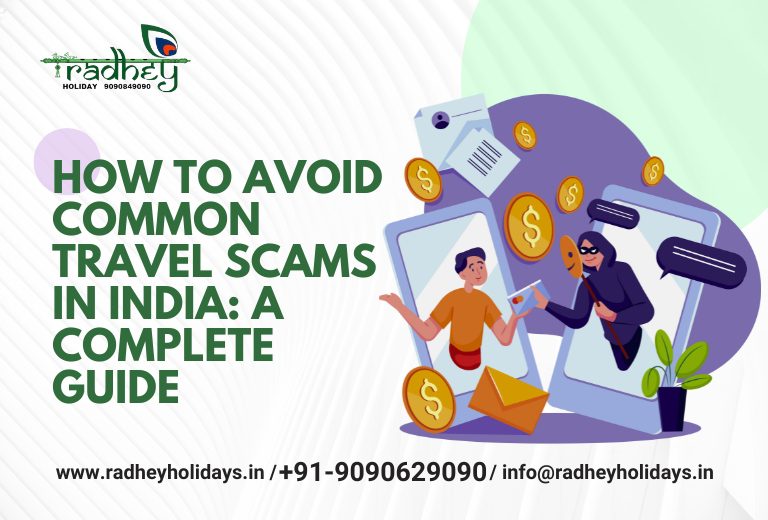How to Avoid Common Travel Scams in India: A Complete Guide
India is a beautiful country with a rich history, vibrant culture, and countless attractions that draw millions of tourists worldwide every year. However, like many popular travel destinations, India also has its share of travel scams. For first-time visitors and even seasoned travelers, falling victim to a scam can ruin an otherwise memorable trip. In this guide, we will share practical tips and advice on avoiding common travel scams in India so that you can explore this incredible country with confidence and peace of mind. 1. Taxi and Auto-Rickshaw Scams Transportation scams are some of the most common in India. Drivers of taxis and auto-rickshaws may refuse to use the meter, claiming it is broken or suggesting a flat rate that is significantly higher than the actual fare. How to Avoid It: Always insist on using the meter. If the driver refuses, find another taxi or auto. Use ride-hailing apps like Ola or Uber for more transparent pricing. Research approximate fares before your journey, so you have a benchmark. If you’re at an airport or railway station, look for prepaid taxi counters to avoid haggling. 2. Fake Tour Guides and Ticket Sellers In tourist-heavy areas, you might encounter individuals posing as official tour guides or ticket sellers. They may offer guided tours or tickets at inflated prices or lead you to fake attractions. How to Avoid It: Book guides through reputable travel agencies or use official guides available at monuments. Purchase tickets only from official counters or authorized websites. Do some research about the attractions you plan to visit, including entry fees and hours of operation. 3. Overpriced Goods and Services Tourists are often charged exorbitant prices for goods, services, or souvenirs. Sellers may claim items are unique, handmade, or rare to justify the high cost. How to Avoid It: Bargain confidently but respectfully, as haggling is common in India. Shop at government-approved emporiums or fixed-price stores to avoid overcharging. Compare prices across multiple shops before making a purchase. 4. The “Helpful Stranger” Scam A common scam involves a “helpful” stranger approaching you at a railway station or bus stand. They may claim your train is delayed or canceled and suggest alternative, expensive options, often leading you to a travel agent who is part of the scam. How to Avoid It: Verify train or bus schedules directly with official counters or websites like IRCTC for trains. Be cautious of unsolicited help. Politely decline assistance if you’re unsure about the person’s intentions. 5. Pickpocketing and Distractions Crowded areas, such as markets, railway stations, and festivals, are prime spots for pickpocketing. Scammers may use distractions like spilling something on you or asking for help to divert your attention. How to Avoid It: Keep your valuables secure and close to your body, preferably in a money belt or inside zippered pockets. Be alert to your surroundings, especially in crowded places. Avoid flashing expensive gadgets or jewelry in public. 6. Fake Currency Scams Receiving counterfeit currency as change is another common scam. This often happens in smaller shops, roadside stalls, or with dishonest drivers. How to Avoid It: Familiarize yourself with the appearance and security features of Indian currency. Avoid large cash transactions; use digital payment methods like UPI, cards, or mobile wallets wherever possible. Count your change and check the notes before leaving. 7. Gem and Carpet Scams Some scammers lure tourists into purchasing expensive gems, carpets, or other items, claiming they are of high value and can be sold for a profit back home. In reality, these items are often fake or worth far less than stated. How to Avoid It: Avoid shopping for high-value items unless you are knowledgeable about them. Decline unsolicited invitations to shops or workshops. If you plan to buy, ensure it is from a trusted and certified seller. 8. Food and Beverage Scams Tourists may be served inflated bills at restaurants or charged for items they did not order. Some street food vendors might overcharge as well. How to Avoid It: Check the menu prices before ordering and keep a copy if possible. Ask for a detailed bill and verify it before paying. Avoid street food vendors who do not display prices openly. 9. Fake Charities and Begging Scams You may encounter people, often children, asking for money for a charity or as beggars. In some cases, these individuals are part of a larger scam operation. How to Avoid It: Instead of giving money directly, donate to reputable charities. Politely decline and walk away if approached. If you wish to help, consider donating food or clothes instead of cash. 10. Hotel Scams Some travelers have experienced scams involving hotels. These include drivers taking you to an alternate hotel, claiming your booked hotel is closed or overbooked, or hotels adding hidden charges to your bill. How to Avoid It: Book hotels through trusted platforms and confirm your reservation in advance. Avoid changing hotels based on a driver’s suggestion. Carefully review your bill for any extra charges before checking out. 11. Overpriced Pilgrimage Tours Religious tourism is popular in India, and scammers often target pilgrims by offering expensive packages or unnecessary rituals. How to Avoid It: Plan your pilgrimage through official channels or reputed travel agencies. Research the standard practices and fees for rituals at your destination. Be cautious of anyone insisting on additional payments for blessings or rituals. 12. Tech Scams With increasing digital transactions, tourists may encounter scams involving fake Wi-Fi networks or phishing attempts via fake websites or apps. How to Avoid It: Use secure and verified Wi-Fi networks; avoid using public Wi-Fi for sensitive transactions. Install apps only from trusted sources like Google Play or the Apple App Store. Be cautious when sharing personal or financial information online. General Tips for Safe Travel in India Stay Informed: Before traveling to a new destination in India, read about common scams specific to that region. Trust Your Instincts: If something feels off or too good to be true, it probably is. Travel Insurance: Invest in comprehensive



